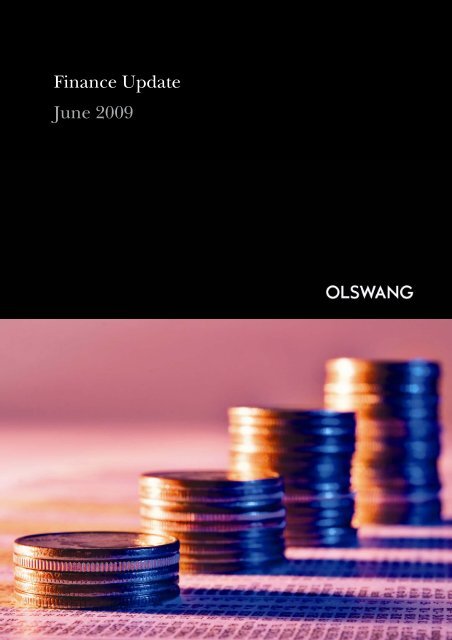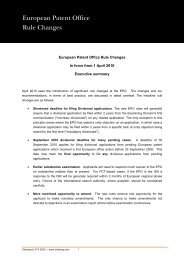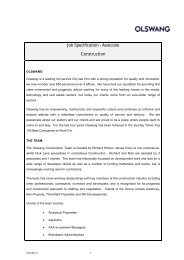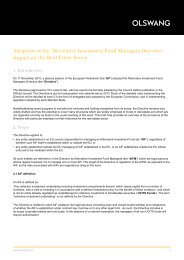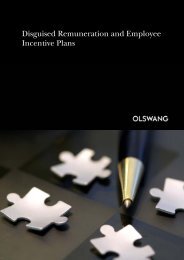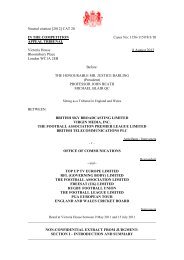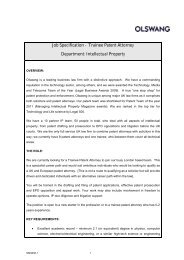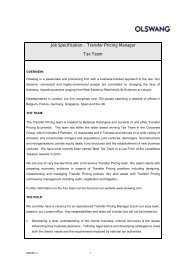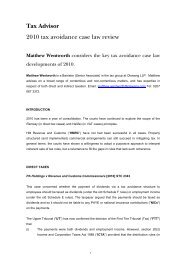Finance Update June 2009 - Olswang
Finance Update June 2009 - Olswang
Finance Update June 2009 - Olswang
Create successful ePaper yourself
Turn your PDF publications into a flip-book with our unique Google optimized e-Paper software.
•<br />
<strong>Olswang</strong> © 2008 | www.olswang.com<br />
<strong>Finance</strong> <strong>Update</strong><br />
<strong>June</strong> <strong>2009</strong>
General <strong>Finance</strong><br />
General <strong>Finance</strong> News<br />
Association of Corporate Treasurers (ACT)<br />
In Spring of <strong>2009</strong>, the Loan Market Association published a revised form of its investment grade loan<br />
facility documentation including new express confidentiality clauses, changes on taxation provisions and<br />
on non-bank lenders appointing a third party to receive communications. A commentary on these changes<br />
is provided in the Slaughter and May Financing Briefing (published on the ACT website) which provides<br />
an update to the main ACT Guide.<br />
Banking Act <strong>2009</strong><br />
As previously reported in the March <strong>2009</strong> <strong>Finance</strong> <strong>Update</strong>, a new special resolution regime (SRR) for<br />
ailing banks came into effect on 21 February <strong>2009</strong>, the provisions of which are set out in the Banking Act<br />
<strong>2009</strong> and related legislation. The statutory objectives of the SRR are, among other things, to protect and<br />
enhance the stability of the financial systems of the UK and public confidence in them, and to protect<br />
depositors. The SRR is comprised of three "stabilisation options": the sale of all or part of the bank's<br />
business to a private sector purchaser, the transfer of all or part of the bank's business to a bridge bank<br />
wholly owned by the Bank of England, or temporary public ownership. The SRR also includes a new bank<br />
insolvency procedure (with a principal function to, among other things, ensure that depositors have their<br />
accounts transferred, or achieve compensation from the Financial Services Compensation Scheme, as<br />
quickly as possible) and a new bank administration procedure to deal with a situation whereby there is a<br />
partial sale or transfer of the bank's business.<br />
The Financial Markets Law Committee has raised concerns about the Banking Act <strong>2009</strong> by way of a letter<br />
to the Banking Reform Team at HM Treasury. The letter includes concerns about the contractual rights of<br />
third parties in light of The Banking Act <strong>2009</strong> (Restriction of Partial Property Transfers) Order <strong>2009</strong>.<br />
Building Societies<br />
The Financial Services Authority (FSA) published a consultation paper, on 5 <strong>June</strong> <strong>2009</strong>, setting out<br />
proposed guidance to ensure that building societies diversifying away from their traditional businesses<br />
have adequate risk management systems and the necessary skills to operate safely. The consultation<br />
period ends on 5 September <strong>2009</strong> and it is intended that proposals resulting from this consultation will be<br />
implemented in 2010.<br />
City of London Law Society<br />
A joint working party of The Law Society Company Law Committee and The City of London Law Society<br />
Company Law and Financial Law Committees has published guidance on the execution of documents at<br />
virtual signings or completions (where parties sign transaction documents and then email or fax signature<br />
pages to the lawyers responsible for compiling the signed transaction documents). The guidance was<br />
published as a consequence of the decision of Underhill J in R (on the application of Mercury Tax Group<br />
<strong>Olswang</strong> LLP © <strong>2009</strong> | www.olswang.com 1
General <strong>Finance</strong><br />
Ltd and another) v HM Revenue & Customs and others [2008] EWHC 2721 (see the January <strong>2009</strong><br />
<strong>Finance</strong> <strong>Update</strong>), which cast into doubt the effectiveness of virtual signings in certain circumstances.<br />
The guidance includes a non-exhaustive range of options for parties wishing to execute documents in such<br />
situations. Each option sets out a series of steps for the parties and their lawyers to follow to build a robust<br />
paper trail in order to reduce the risk of disputes over matters such as which version of an agreement was<br />
entered into or whether a party's lawyer had authority to attach a pre-signed execution page to the final<br />
draft. A firm-wide note on best practice for virtual completions is being put together.<br />
The guidance is here.<br />
Companies Act 2006<br />
A variety of legislation has been published in relation to the Companies Act 2006, including the following:<br />
• the Company and Business Names (Miscellaneous Provisions) Regulations <strong>2009</strong> were<br />
published on 6 May, together with an explanatory memorandum. These Regulations deal with<br />
restrictions relating to the registered name of a company and business names and are due to<br />
come into force on 1 October <strong>2009</strong>;<br />
• a revised draft of the Registrar of Companies and Applications for Striking Off Regulations<br />
<strong>2009</strong> was published on 21 May. This revises the previous version of these Regulations, published<br />
at the end of last year, to allow, amongst other things, for overseas companies to apply for<br />
rectification of certain information on the Companies House Register;<br />
• a revised draft of the Overseas Companies Regulations <strong>2009</strong> was published on 21 May. These<br />
Regulations impose various registration and filing requirements on companies incorporated<br />
overseas which open a branch or place of business in the UK. It is intended that these<br />
Regulations will come into force on 1 October <strong>2009</strong>; and<br />
• the Overseas Companies (Company Contracts and Registration of Charges) Regulations<br />
<strong>2009</strong> have been the subject of a government consultation. Under the Companies Act 2006, an<br />
overseas company is only required to register at Companies House where it has an establishment<br />
(a branch or place of business which is not a branch) in the UK. Therefore, registration of charges<br />
for overseas companies will only apply to an overseas company if they have registered an<br />
establishment, which can be checked on the Companies House register. These Regulations are<br />
due to come into effect on 1 October <strong>2009</strong>, however, as can be seen in the government response<br />
to the consultation, they are likely to reviewed (along with the regime for registration of charges for<br />
UK companies) in 2010.<br />
Department for Business Innovation and Skills<br />
The Department for Business Enterprise and Regulatory Reform has been renamed as the Department for<br />
Business Innovation and Skills (BIS).<br />
<strong>Olswang</strong> LLP © <strong>2009</strong> | www.olswang.com 2
General <strong>Finance</strong><br />
HM Treasury<br />
On 7 May, HM Treasury published a report 'UK International Financial Services – The Future'. The<br />
Report states that the UK’s financial services sector can continue to be a world leader by working<br />
alongside businesses and emerging economies, while encouraging global regulatory reform.<br />
Limited Partnerships and Limited Liability Partnerships<br />
Draft Limited Liability Partnerships (Application of Companies Act 2006) Regulations <strong>2009</strong> were<br />
published on 27 May. It is intended that these Regulations will replace the provisions in a variety of<br />
regulations relating to the Companies Act 1985 with those relating to the Companies Act 2006 and that<br />
these Regulations will come into force on 1 October <strong>2009</strong>.<br />
A draft Legislative Reform (Limited Partnerships) Order <strong>2009</strong> was published on 4 <strong>June</strong>. This Order is<br />
intended to clarify the process for registration of limited partnerships and to remove uncertainties around<br />
the application of the Limited Partnerships Act 1907. This is expected to come into force on 1 October<br />
<strong>2009</strong>.<br />
Remuneration<br />
The Committee of European Banking Supervisors has published its final high-level principles for<br />
remuneration policies. It expects these to be implemented before the third quarter of <strong>2009</strong>, allowing for a<br />
transitional period in relation to existing contracts.<br />
Investor groups, such as The Co-operative Asset Management, has suggested that chairmen of<br />
remuneration committees should subject their jobs to an annual shareholder vote in order to achieve fairer<br />
remuneration policies for directors and high ranking employees.<br />
Interest Rates<br />
On 7 May, the Bank of England announced that interest rates would again be held at 0.5% and that it<br />
would continue with the programme of asset purchases, but that this would be increased by £50 billion to<br />
£125 billion (both of these proposals were unanimously agreed by the Monetary Policy Committee). On 4<br />
<strong>June</strong>, the Bank of England announced that interest rates would again be held at 0.5% and that it would<br />
continue with the £125 billion programme of asset purchases (both of these proposals were again<br />
unanimously agreed by the Monetary Policy Committee).<br />
On 4 <strong>June</strong>, the European Central Bank held interest rates at 1.00% across the euro-zone.<br />
World Markets<br />
According to estimates released by the National Institute of Economic and Social Research, the UK<br />
economy's gross domestic product grew by 0.1% in May, following on from a similar increase in April. The<br />
Office for National Statistics data also showed that manufacturing output increased by 0.2% in March and<br />
industrial output increased by 0.3% in April (this was the first increase in 14 months). These data seem to<br />
indicate that the economy is stabilising. This was backed up by a statement, at the beginning of May, from<br />
<strong>Olswang</strong> LLP © <strong>2009</strong> | www.olswang.com 3
General <strong>Finance</strong><br />
the Organisation for Economic Co-operation and Development (OECD) that the country is experiencing a<br />
pause in the economic slowdown. The International Monetary Fund (IMF) has also stated that there are<br />
hopeful signs the UK economic slump is easing but cautions that the economy remains vulnerable and that<br />
recovery is likely to be slow.<br />
Money market rates have also fallen over the last few months and the overnight index swap spread<br />
between three month LIBOR and risk free overnight market rates has fallen to levels not seen since the<br />
collapse of Lehman Brothers last September. However, this may not give an accurate picture, as the rates<br />
at which banks can borrow varies from institution to institution and small banks (which are considered to<br />
have a greater counterparty risk) are likely to still be facing higher borrowing costs.<br />
The LPX UK Index (which tracks listed private equity stocks) rose 47% between the end of March and the<br />
end of May and the FTSE All Share index rose by 16% in the same period, indicating that confidence may<br />
be starting to return to the private equity sector. However, according to Experian, UK shopping numbers<br />
fell by 2.4% in May compared with May 2008.<br />
Globally, official figures have shown that Europe as a whole is in its deepest recession since the Second<br />
World War, with gross domestic product shrinking significantly in Germany, Italy, Austria, Spain and the<br />
Netherlands in particular. In light of these figures, the IMF has warned that the global recession is far from<br />
over. In the US, new Federal Reserve forecasts have predicted that the US economy may contract by up<br />
to 2% this year (this is an increase on earlier predictions of a 1.3% contraction).<br />
Finally, there continues to be widespread talk of reform nationally and internationally in relation to financial<br />
supervision, with numerous consultation papers being published and much debate centring round this<br />
issue.<br />
<strong>Olswang</strong> LLP © <strong>2009</strong> | www.olswang.com 4
General <strong>Finance</strong><br />
General <strong>Finance</strong> Cases<br />
Appropriation of Shares<br />
The case of (1) Cukurova <strong>Finance</strong> International Ltd (2) Cukurova Holding AS v Alfa Telecom Turkey Ltd<br />
[<strong>2009</strong>] UKPC was heard on appeal, from the Court of Appeal of the British Virgin Islands, by the Judicial<br />
Committee of the Privy Council. (For a summary of the facts of this case see the July 2008 <strong>Finance</strong><br />
<strong>Update</strong> and the January <strong>2009</strong> <strong>Finance</strong> <strong>Update</strong>).<br />
In this case it was held that under English law a pragmatic approach to the interpretation of the right of<br />
'appropriation' in Directive 2002/47 and the Financial Collateral Arrangements (No.2) Regulations 2003<br />
should be taken. It was noted that the Directive itself did not have direct effect and member states were<br />
required to transpose it into national law so as to provide 'rapid and non-formalistic enforcement<br />
procedures' with reference to concepts of law familiar in each member state. The judges commented that<br />
the Treasury 'seems to have thought that appropriation was an already familiar remedy in the United<br />
Kingdom, so that it was not necessary to define it or give any detailed guidance as to how a power of<br />
appropriation was to be exercised.'<br />
It was concluded that it was not necessary for a valid appropriation to take place that the collateral taker<br />
becomes registered holder of the shares as this would go against the 'rapid and non-formalistic<br />
enforcement procedures' envisaged by the Directive. However, neither can the power of appropriation be<br />
exercised 'merely by taking thought' i.e. without taking any form of action at all. There needs to be an overt<br />
act, communicated to the collateral-provider, evidencing the intention to exercise the power of<br />
appropriation. In this case the letter from the collateral-taker to the collateral-provider stating its intention<br />
was an effective exercise of this power.<br />
Guarantees<br />
In the case of Bank of Scotland plc v (1) Constantine Makris (2) Ben O'Sullivan (<strong>2009</strong>) Ch D 15/5/<strong>2009</strong> it<br />
was held there was no basis on which to show that a significant reduction in the facilities provided was a<br />
material variation sufficient to discharge the bank's security.<br />
Facts: B financed, by way of an overdraft facility, the funding of a pub. In relation to the provision of this<br />
overdraft, M and O gave B an unsecured joint and several guarantee for £50k (plus interest and costs).<br />
This guarantee was executed and dated. B then reduced the amount of the overdraft by £20,000, as the<br />
other guarantees and security being provided were found to be of a lesser value than expected and a<br />
revised facility letter was issued for this amount. The business failed and went into creditors voluntary<br />
liquidation. B claimed under their guarantee. M claimed that the guarantee had been discharged as a<br />
result of the reduction in the overdraft facility after the guarantee had been signed and O claimed that he<br />
had signed the guarantee as a result of the undue influence of their third business partner (S).<br />
Decision: In the circumstances, i.e. the fact that one of the signatories on the facility letter itself had been<br />
M, M could not challenge the validity of second facility letter and there was no basis for concluding that the<br />
execution of the guarantee or any of the circumstances around it supported O's allegation of undue<br />
<strong>Olswang</strong> LLP © <strong>2009</strong> | www.olswang.com 5
General <strong>Finance</strong><br />
influence on the part of S. S, O and M were all close friends and there was no reason for B to be put on<br />
notice that there was any abuse of trust between the three.<br />
<strong>Olswang</strong> LLP © <strong>2009</strong> | www.olswang.com 6
Real Estate <strong>Finance</strong><br />
Real Estate <strong>Finance</strong> News<br />
Land Registry<br />
The Land Registry launched a consultation to amend the Land Registration Rules 2003 in response to the<br />
Overseas Companies (Company Contracts and Registration of Charges) Regulations <strong>2009</strong>. Minor<br />
changes to the Commonhold (Land Registration) Rules 2004 have also been proposed to reflect the<br />
changes introduced by the Companies Act 2006. The consultation period ended on 12 <strong>June</strong>.<br />
Real Estate <strong>Finance</strong> Market<br />
According to the latest CBRE monthly index, UK commercial property values fell 1.5% in May. This fall is<br />
less than the 2.1% drop in April and the 2.8% drop in March. However, according to April's IPD UK<br />
Monthly Index, commercial property rental values fell 3.21% in April, the largest fall since December 1992.<br />
Commercial property lending has also remained subdued in the first quarter of <strong>2009</strong> with banks lending<br />
£1.9bn, down 80% on the same period last year, however, this is higher than the £1.5bn figure for the<br />
fourth quarter of 2008.<br />
According to figures from Nationwide, house prices rose by 1.2% in May (but are 11.3% lower than a year<br />
ago). Land Registry figures for house prices in April show that the rate of falls in house prices has slowed.<br />
According to RICS, there is an increased level of confidence in the housing market and the average<br />
number of properties sold per estate agent rose to 11.8 (averaged over the last three months), up from<br />
10.6. According to the British Bankers' Association, the number of mortgages approved for new home<br />
purchases rose by 4% between March and April, also indicating some stability is entering the housing<br />
market. However, during the same period the number of re-mortgages fell as home owners chose to go<br />
onto their lender's variable rates rather than applying for and taking up new mortgage deals.<br />
According to the Council of Mortgage Lenders, the number of home repossessions has increased by 50%<br />
in the past year. Figures for the first quarter of <strong>2009</strong> showed that 12,800 homes were repossessed, up<br />
from 10,400 in the fourth quarter of 2008 and from 8,500 for the same period last year. At the same time<br />
questions have been raised over the mortgage rescue plan launched by the government at the start of the<br />
year to stop repossessions, with certain commentators stating that it has been ineffective, accepting only<br />
two households so far.<br />
<strong>Olswang</strong> LLP © <strong>2009</strong> | www.olswang.com 7
Structured <strong>Finance</strong><br />
Structured <strong>Finance</strong> News<br />
Film <strong>Finance</strong><br />
According to Screen <strong>Finance</strong>, production investment has fallen by 8% in the first quarter of this year to<br />
£238.4m and the number of new starts has nearly halved compared with the comparable period last year,<br />
from 19 in the first quarter of 2008 to just 11 in the first quarter of <strong>2009</strong>. This is backed by the figures from<br />
a BDO Stoy Hayward survey, in which just 38% of technology, media and telecoms businesses said it was<br />
easy to get access to new funding, compared with a figure of 73% in 2008.<br />
Hedge Funds<br />
According to Hedge Fund Research, hedge funds had their best month in April since February 2000.<br />
Hedge funds gained 3.8% over the course of the month, taking their gains this year to 4.2%, taking<br />
advantage of increases in the stock markets and opportunities in the fixed income and energy markets.<br />
Islamic <strong>Finance</strong><br />
The Islamic Financial Services Board's sixth annual summit met in May in Singapore. This summit looked<br />
at the current position of the Islamic financial services industry, ways of raising the competitive elements of<br />
institutions offering Islamic financial services and the infrastructure required to support the further growth of<br />
this industry, amongst other things.<br />
Walker Guidance<br />
On 30 April, the Guidelines Monitoring Group published an updated report on compliance with the Walker<br />
Guidelines along with recommendations for changes to these guidelines. According to the report, all<br />
private equity firms subject to the guidelines have now fully complied, although five portfolio companies are<br />
yet to fully meet the required standards. The Guidelines Monitoring Group aims to publish a further report<br />
into compliance at the end of <strong>2009</strong>.<br />
<strong>Olswang</strong> LLP © <strong>2009</strong> | www.olswang.com 8
Restructuring and Insolvency<br />
Restructuring and Insolvency News<br />
Insolvency Legislation<br />
Several pieces of insolvency legislation have been published, including the following:<br />
• the Financial Markets and Insolvency Regulations <strong>2009</strong> - these regulations make amendments<br />
to the insolvency regime for recognised clearing houses and recognised foreign investment<br />
exchanges and came into force on 15 <strong>June</strong> <strong>2009</strong>; and<br />
• the draft Legislative Reform (Insolvency) (Miscellaneous Provisions) Order <strong>2009</strong> – this is<br />
intended to amend the Insolvency Act 1986 to reduce burdens to benefit creditors of insolvent<br />
companies, members of solvent companies and other interested parties through increased<br />
dividends.<br />
Restructuring and Insolvency Market<br />
According to the Ministry of Justice, in the first quarter of <strong>2009</strong> the following number of petitions were<br />
issued:<br />
• 3,461 company winding up petitions – an increase of 13% on the first quarter of 2008 and a 2%<br />
increase on the fourth quarter of 2008;<br />
• 4,535 creditors' bankruptcy petitions – an decrease of 5% on the first quarter of 2008 and a 4%<br />
decrease on the fourth quarter of 2008; and<br />
• 16,775 debtors' bankruptcy petitions – an increase of 29% on the first quarter of 2008 and a 9%<br />
increase on the fourth quarter of 2008.<br />
Distressed debt trading rose during May as many bankers and investors sold on difficult or non-performing<br />
positions due to the rise in loan and bond prices, European loan prices rose by a third from the low figures<br />
seen in the last quarter of 2008, to levels last seen before the collapse of Lehman Brothers, according to<br />
Standard & Poor's. However, many in the industry are speculating that the price increase is unlikely to<br />
last, according to the Financial Times.<br />
<strong>Olswang</strong> LLP © <strong>2009</strong> | www.olswang.com 9
Restructuring and Insolvency<br />
Restructuring and Insolvency Cases<br />
Administration – administrator's release from liability<br />
The case of Mark Hardy v Michael Vincent McLoughlin and Allan Watson Graham [<strong>2009</strong>] EWHC 944 (Ch)<br />
considered an application to set aside an administrator's release from liability, under s20 of the Insolvency<br />
Act 1986.<br />
Facts: H applied, under s20 of the Insolvency Act, to set aside an order releasing the administrators from<br />
liability as administrators of a company in liquidation. Under s20, such an order can be made if the<br />
relevant administration, or the application granting the release from liability, is subject to fraudulent activity.<br />
In this case it was alleged that the original application for release of liability had been obtained by fraud<br />
and false accounting and that the administrators owed H damages for breach of duty.<br />
Decision: The application was rejected. The court held that H had only shown irregularities in the<br />
application for release made by the administrators, rather than actual fraud. It was also held that H lacked<br />
standing to bring such application, the administrators owed fiduciary and common law duties to the<br />
company over which they were appointed, they did not owe a duty of care to the creditors, shareholders or<br />
officers of that company. The administrators did not intend that individuals should rely on any<br />
representations made by them, therefore H could not claim misrepresentation in relation to these.<br />
Bankruptcy<br />
The case of Re Hamid Dehdashti Haghighat (a bankrupt) [<strong>2009</strong>] EWHC 934 (Ch) considered an<br />
application for a review of a previous decision, under s375 of the Insolvency Act 1986. (The previous<br />
decision was summarised in the February <strong>2009</strong> <strong>Finance</strong> <strong>Update</strong>.)<br />
Facts: H applied for a re-hearing on the basis that documents (primarily a trust deed) which should have<br />
been considered at the previous hearing in support of his position were not considered by the court. H<br />
argued that these documents made a material difference to his position and also that he had not attended<br />
to the previous hearing to make submissions on his own behalf.<br />
Decision: It was held that H had made a case which was worthy of consideration for the preliminary issue<br />
to be reopened and for there to be a re-hearing, under section 375 of the Insolvency Act 1986. However,<br />
the court declined to make an order for a re-hearing as H had not shown that there was any prospect of a<br />
different outcome resulting from such re-hearing.<br />
It appears that in order for such an application to succeed, an applicant is required to illustrate that any rehearing<br />
has a reasonable chance of reaching a different conclusion from that made at the previous<br />
hearing.<br />
<strong>Olswang</strong> LLP © <strong>2009</strong> | www.olswang.com 10
The information in this update is intended as a general overview only of the subjects covered.<br />
Detailed specialist advice should always be taken before taking or refraining from taking any<br />
action. For more guidance on the changes and their application, please get in touch with your<br />
usual <strong>Olswang</strong> contact.<br />
<strong>Olswang</strong> LLP © <strong>2009</strong> | www.olswang.com 11
About <strong>Olswang</strong><br />
<strong>Olswang</strong> is a leading business law firm with a distinctive approach. Our pioneering and problem-solving<br />
ethos has established a commanding reputation in the technology, media and real estate sectors, as well<br />
as a wide range of other industries.<br />
Founded in 1981, our Firm has grown to a team of over 600, including 90 partners, across four European<br />
offices. In addition, <strong>Olswang</strong> has a formal alliance with a major US firm Greenberg Traurig LLP and a longestablished<br />
best friends network of leading independent law firms throughout the world.<br />
Our Firm continues to be acknowledged as a leading practice in many of our core areas: <strong>Olswang</strong> was<br />
voted TMT Team of the Year 2008 at the annual Legal Business Awards; <strong>Olswang</strong>'s Corporate Group won<br />
M&A Law Firm of the Year at the M&A Awards 2008 in conjunction with M&A Magazine.<br />
Resourceful drive and a climate of shared knowledge and empowerment are the hallmarks of our<br />
meritocratic, unstuffy culture. For the last four years <strong>Olswang</strong> has been ranked in The Sunday Times 100<br />
Best Companies to Work For and our strong management team is dedicated to the personal and<br />
professional development of our people.<br />
We recruit personalities with a genuine fascination and notable reputation in the sectors they focus on,<br />
which is reflected in the quality of our advice. We also understand the importance of achieving our clients’<br />
goals and ensure that our advice is, above all else, practical.<br />
From world-class businesses to entrepreneurial startups, the rich diversity of our client base ensures a<br />
broader perspective and, as a result, deeper commercial insight. Transactional work is the most obvious<br />
feature of the role we perform. However, ongoing non-transactional support is an integral part of our<br />
business, and we focus on creating long-term relationships with our clients. We employ a range of<br />
proactive initiatives such as client care programmes, secondments, client training and feedback sessions<br />
to ensure our client relationships are strong.<br />
At <strong>Olswang</strong> the passion of our lawyers, the confidence of our approach and the commercial edge to our<br />
advice provide a unique and compelling service.<br />
.<br />
<strong>Olswang</strong> LLP © <strong>2009</strong> | www.olswang.com 12
London<br />
<strong>Olswang</strong> LLP<br />
90 High Holborn<br />
London WC1V 6XX<br />
T +44 (0) 20 7067 3000<br />
F +44 (0) 20 7067 3999<br />
Thames Valley<br />
<strong>Olswang</strong> LLP<br />
Apex Plaza, Forbury Road<br />
Reading RG1 1AX<br />
T +44 (0) 20 7067 3000<br />
F +44 (0) 20 7071 7499<br />
Berlin<br />
<strong>Olswang</strong> LLP<br />
Potsdamer Platz 1<br />
D-10785 Berlin<br />
T +49 (0) 30 700171-100<br />
F +49 (0) 30 700171-900<br />
Brussels<br />
<strong>Olswang</strong> LLP<br />
Avenue Louise 326 bte 26<br />
Louizalaan 326 bus 26<br />
B-1050 Bruxelles/Brussel<br />
T +32 2 647 4772<br />
F +32 2 644 2165<br />
3606968-1


